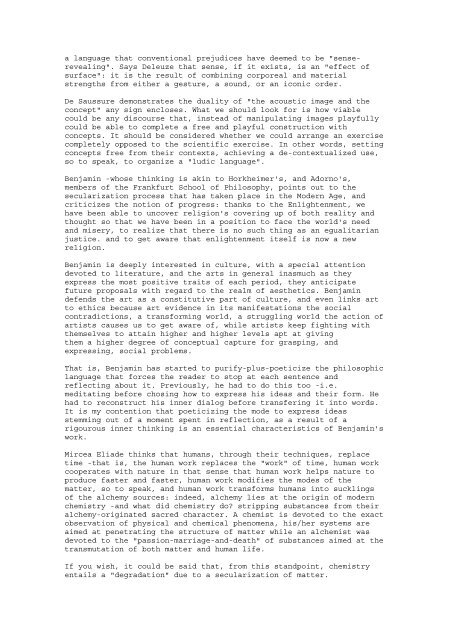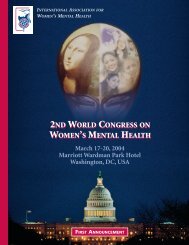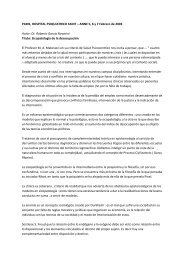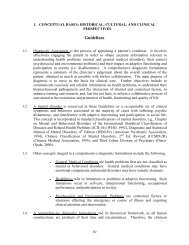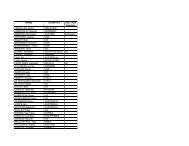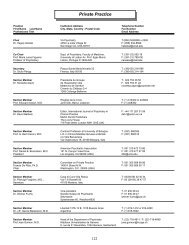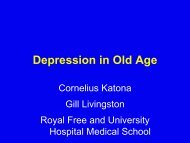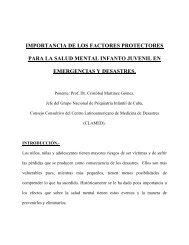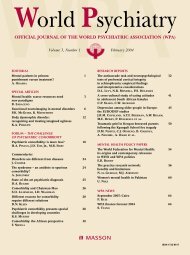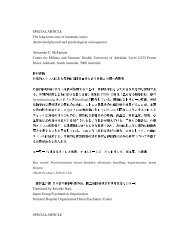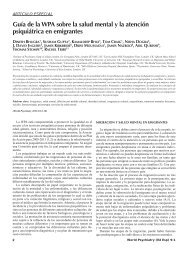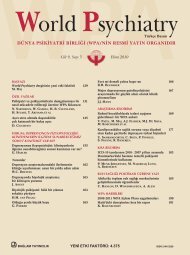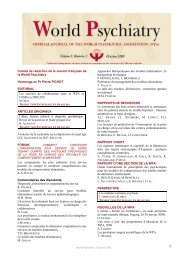the mass media and their relationship with the postmodern culture
the mass media and their relationship with the postmodern culture
the mass media and their relationship with the postmodern culture
Create successful ePaper yourself
Turn your PDF publications into a flip-book with our unique Google optimized e-Paper software.
a language that conventional prejudices have deemed to be "senserevealing".Says Deleuze that sense, if it exists, is an "effect ofsurface": it is <strong>the</strong> result of combining corporeal <strong>and</strong> materialstrengths from ei<strong>the</strong>r a gesture, a sound, or an iconic order.De Saussure demonstrates <strong>the</strong> duality of "<strong>the</strong> acoustic image <strong>and</strong> <strong>the</strong>concept" any sign encloses. What we should look for is how viablecould be any discourse that, instead of manipulating images playfullycould be able to complete a free <strong>and</strong> playful construction <strong>with</strong>concepts. It should be considered whe<strong>the</strong>r we could arrange an exercisecompletely opposed to <strong>the</strong> scientific exercise. In o<strong>the</strong>r words, settingconcepts free from <strong>the</strong>ir contexts, achieving a de-contextualized use,so to speak, to organize a "ludic language".Benjamin -whose thinking is akin to Horkheimer's, <strong>and</strong> Adorno's,members of <strong>the</strong> Frankfurt School of Philosophy, points out to <strong>the</strong>secularization process that has taken place in <strong>the</strong> Modern Age, <strong>and</strong>criticizes <strong>the</strong> notion of progress: thanks to <strong>the</strong> Enlightenment, wehave been able to uncover religion's covering up of both reality <strong>and</strong>thought so that we have been in a position to face <strong>the</strong> world's need<strong>and</strong> misery, to realize that <strong>the</strong>re is no such thing as an egualitarianjustice. <strong>and</strong> to get aware that enlightenment itself is now a newreligion.Benjamin is deeply interested in <strong>culture</strong>, <strong>with</strong> a special attentiondevoted to literature, <strong>and</strong> <strong>the</strong> arts in general inasmuch as <strong>the</strong>yexpress <strong>the</strong> most positive traits of each period, <strong>the</strong>y anticipatefuture proposals <strong>with</strong> regard to <strong>the</strong> realm of aes<strong>the</strong>tics. Benjamindefends <strong>the</strong> art as a constitutive part of <strong>culture</strong>, <strong>and</strong> even links artto ethics because art evidence in its manifestations <strong>the</strong> socialcontradictions, a transforming world, a struggling world <strong>the</strong> action ofartists causes us to get aware of, while artists keep fighting <strong>with</strong><strong>the</strong>mselves to attain higher <strong>and</strong> higher levels apt at giving<strong>the</strong>m a higher degree of conceptual capture for grasping, <strong>and</strong>expressing, social problems.That is, Benjamin has started to purify-plus-poeticize <strong>the</strong> philosophiclanguage that forces <strong>the</strong> reader to stop at each sentence <strong>and</strong>reflecting about it. Previously, he had to do this too -i.e.meditating before chosing how to express his ideas <strong>and</strong> <strong>the</strong>ir form. Hehad to reconstruct his inner dialog before transfering it into words.It is my contention that poeticizing <strong>the</strong> mode to express ideasstemming out of a moment spent in reflection, as a result of arigourous inner thinking is an essential characteristics of Benjamin'swork.Mircea Eliade thinks that humans, through <strong>the</strong>ir techniques, replacetime -that is, <strong>the</strong> human work replaces <strong>the</strong> "work" of time, human workcooperates <strong>with</strong> nature in that sense that human work helps nature toproduce faster <strong>and</strong> faster, human work modifies <strong>the</strong> modes of <strong>the</strong>matter, so to speak, <strong>and</strong> human work transforms humans into sucklingsof <strong>the</strong> alchemy sources: indeed, alchemy lies at <strong>the</strong> origin of modernchemistry -<strong>and</strong> what did chemistry do? stripping substances from <strong>the</strong>iralchemy-originated sacred character. A chemist is devoted to <strong>the</strong> exactobservation of physical <strong>and</strong> chemical phenomena, his/her systems areaimed at penetrating <strong>the</strong> structure of matter while an alchemist wasdevoted to <strong>the</strong> "passion-marriage-<strong>and</strong>-death" of substances aimed at <strong>the</strong>transmutation of both matter <strong>and</strong> human life.If you wish, it could be said that, from this st<strong>and</strong>point, chemistryentails a "degradation" due to a secularization of matter.


